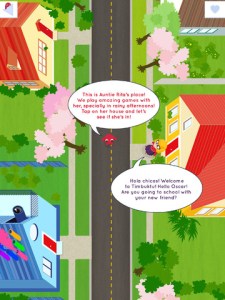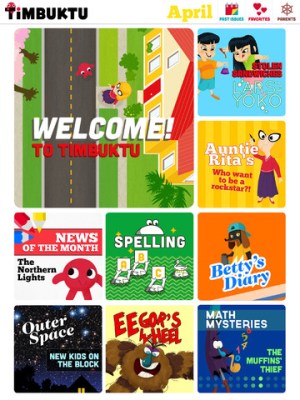Timbuktu, an adorably designed educational and entertainment-focused iPad app for kids, has finally revamped its business model, which had previously been a terrible example of how children’s apps too often try to grow their revenue by tricking kids into purchasing in-app content. The company now admits that its virtual allowance mechanism was too misleading, and has moved forward with a much simpler subscription option. The new app is worth the download.
The 500 Startups-backed company, founded by Elena Favilli (CEO) and Francesca Cavallo (Creative Director), had launched the original version of the app at the beginning of last year, followed by a major revamp towards year-end. There was a lot to like about Timbuktu, which is cleverly designed, with bright colors and illustrations, offering kids a magazine-like experience which later became more of a playtime idea board, filled with daily activities for parents and kids to do together, including stories to read, printables, craft ideas, and more.
 The problem was that the way users paid for content was less than ideal. Some days, content would be free, but other days you would have to pay. Worse, the app used “virtual bubbles” which users would pop to buy the premium content and stories. Obviously, this type of design encourages younger users to interact – and possibly then pay for – items their parents didn’t approve.
The problem was that the way users paid for content was less than ideal. Some days, content would be free, but other days you would have to pay. Worse, the app used “virtual bubbles” which users would pop to buy the premium content and stories. Obviously, this type of design encourages younger users to interact – and possibly then pay for – items their parents didn’t approve.
Of course the iPad has parental controls and other mechanisms to prevent purchases like this from happening – but that’s not been enough to prevent some rather high-profile examples of what can go wrong when kids are left in charge. And to actually design an app in such a way to make the purchases seem like content, is pretty awful.
Co-founder Elena Favilli recently reached out to us about the new version, saying that the concerns we brought up in our previous review have now been addressed.
“You were rightfully complaining about our purchase model,” she said. “We got rid of bubbles, because they proved to be too misleading. In our intention, parents could give kids a virtual allowance to spend on Timbuktu, but – as a matter of fact – they liked to pop bubbles too much and parents felt it was out of their control,” Favilli explains.
“We saw from our data and from our user testing sessions that parents didn’t like bubbles and children didn’t want a new story every single day,” she says, detailing the app’s recent adjustments. “So, on one side we had parents asking for a clearer and safer purchase process; on the other side we had children asking to see the same stories for a longer period of time. Those are the two biggest motivations behind our change.”
The new version of the app introduces a different, simpler subscription model. Now parents can make purchases in a “grown-ups area” to unlock all of Timbuktu’s content for $29.99 per year, or $4.99 per month. This area is separated from the other content areas so that children are not exposed to in-app purchases, Favilli says.
And as noted above, the app will now receive content updates monthly rather than daily. There are currently three available issues with nine stories each. Each issue offers two stories for free.
Also gone are the social sharing options, which helps to make the new version COPPA-compliant. Going forward, the new app focuses more on stories, and is now developing some of Timbuktu Magazine’s favorite characters: for example, Bello is a detective who solves math mysteries, Betty is a wiener dog who loves skating and is bad at grammar, and Lars and Yoko are seven year-old twins who create funny science experiments.
“We’ve been working a lot on the design and development of a strong set of characters because children are more engaged if they can relate to a character and can feel that learning is part of a great shared adventure,” says Favilli. She adds that the company is also working on international licensing agreements to bring Timbuktu Magazine in other countries, and is moving to make its technology available for other publishers interested in the children’s app space.
Despite the content’s quality, it was difficult to fully recommend Timbuktu before. Now, it’s a much better app from the parent’s point of view. The new version is live here in iTunes.
